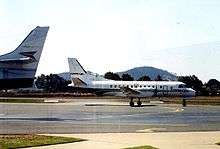Kendell Airlines
|
| |||||||
| |||||||
| Founded | 1967 (as Premiair Aviation) | ||||||
|---|---|---|---|---|---|---|---|
| Ceased operations | 2001 | ||||||
| Operating bases |
Wagga Wagga Airport Albury Airport Devonport Airport | ||||||
| Hubs |
Adelaide Airport Sydney Airport | ||||||
| Alliance | Star Alliance | ||||||
| Parent company | Ansett Australia (since the 1990s) | ||||||
| Headquarters | Wagga Wagga, Australia | ||||||
| Key people | Don Kendell (founder, former owner and CEO) | ||||||
Kendell Airlines was a regional airline in Australia, in the 1990s the largest in the country. It served major regional centres in New South Wales, Victoria, South Australia and Tasmania from Melbourne, Adelaide, and Sydney. Many of its services were in co-operation with its parent company Ansett Australia from the 1990s.
History
The airline was founded in 1967 as Premiair Aviation by aviation enthusiast Don Kendell and partners, originally serving as an air charter provider and flying school, based in Wagga Wagga.[1] In 1971, the name of the company was changed to Kendell Airlines, which coincided with the launch of scheduled services using Piper PA-31 Navajo aircraft between Wagga Wagga and Melbourne, a route which had previously been operated by Ansett Airlines (later called Ansett Australia).[2] Shortly afterwards, the route network was expanded with flights to Sydney and Canberra.
Flight operations saw a further increase when de Havilland Heron and Swearingen Metro II aircraft were added to the fleet, the latter in May 1979 following the Second Oil Crisis.[1] On 25 February 1985 the airline introduced the 34-seat Saab 340, a more modern regional airliner; Kendell was the first airline in the southern hemisphere to operate the Saab 340, with further aircraft of that type being added over the following years. The route network was nearly doubled in early 1986 when the South Australian routes of Airlines of South Australia (which was owned by Ansett) were taken over[1] as a consequence of the deregulation of the Australian airline market. During the 1990s, Kendell established further operating bases to add to its original one at Wagga Wagga Airport, namely at Devonport Airport, Albury Airport and Sydney Airport,[1] which was due to the airline becoming a subsidiary of Ansett.
From March 1996, Kendell Airlines offered the Capital Shuttle – a high-frequency (up to 13 daily return flights) service between Sydney and Canberra – on behalf of Ansett, which was followed by scheduled flights to Coffs Harbour and Ballina, which also had previously been operated by Ansett. The Saab 340s that were acquired by Kendell Airlines during that period were painted in Ansett colors. In 1999, Kendell became a regional affiliate of the Star Alliance, of which Ansett Australia had become a member.

Between 1999 and 2001, Kendell Airlines took delivery of 18 Bombardier CRJ200s, the first jet aircraft to be operated by the airline.[3] On 14 September 2001, shortly after the last CRJ had joined the fleet, Ansett Australia collapsed, also grounding the fleet of Kendell Airlines. Kendell Airlines was placed into administration, but continued to operate a limited schedule, and also filled a temporary void left by Ansett Australia by flying on the Sydney–Canberra–Melbourne and Melbourne–Mount Gambier–Adelaide routes. In 2002, Kendell, and fellow Ansett subsidiary, Hazelton Airlines, were sold to a consortium known as Australiawide Airlines, from which Regional Express Airlines (known as Rex) was formed. Most of the turboprop aircraft operated by Kendell Airlines at that time were taken over by Rex.
Awards
- 1990: Best National Airline, by the Civil Aviation Safety Authority, surpassing Qantas.[1]
- 1992: Regional Airlines of the Year, by Air Transport World magazine.[1]
Fleet
_at_Merimbula_Airport.jpg)
Over the years, Kendell Airlines operated the following aircraft types:
| Aircraft | Introduced | Retired |
|---|---|---|
| Bombardier CRJ200 | ||
| de Havilland Heron | ||
| Fairchild Swearingen Metroliner | ||
| Saab 340 | ||
| Piper PA-31 Navajo | ||
Accidents and incidents
- On 1 July 1992, a Kendell Airlines, SAAB 340A, VH-EKT, on a scheduled passenger service from Melbourne, Victoria to Devonport, Tasmania with 17 passengers and 3 crew lost directional control on landing. The aircraft departed the runway and ran through a ditch in soft muddy ground. Substantial damage was sustained to the aircraft but there were no injuries to passengers or crew. The cause, a severe asymmetric thrust condition developed after landing when reverse thrust was selected but the right propeller remained at a positive blade angle. This was due to the right propeller control unit being defective from an internal oil leakage across the feathering solenoid valve. The aircraft was repaired and returned to service. It still flies today as a cargo aircraft.[4]
- On 11 November 1998, a Kendell Airlines SAAB 340A, VH-LPI went into a stall with the two pilots losing control for around 10 seconds, due to icing of the aircraft that was experienced near Lake Eildon on a scheduled flight from Albury to Melbourne. The solitary flight attendant received a minor injury when the aircraft descended 2,300 feet (approximately 700 metres) during the loss of control and subsequent recovery. None of the 28 passengers were injured and the flight continued to Melbourne Airport.[5][6]
References
- 1 2 3 4 5 6 McCormack, Michael (15 October 2001). "Airline founder one of a kind". The Daily Advertiser. p. 6.
- ↑ Kendell history
- ↑ Kendell Airlines fleet of CRJ aircraft at planespotters.net
- ↑ Bureau Of Air Safety Investigation Report
- ↑ ATSB report on the 1998 incident
- ↑ Kendell Airlines at the Aviation Safety Network